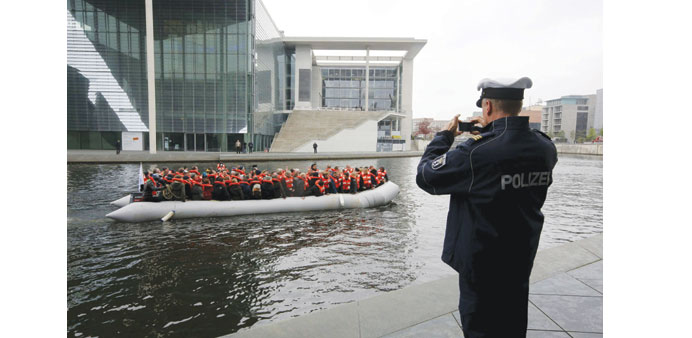A dinghy used by migrants, carrying members of the parliament and volunteers on the river Spree in Berlin, Germany, yesterday.
AFP
Berlin
Germany, facing a record migrant influx, will extend temporary border controls until the end of October, with a special focus on the Austrian border, the interior ministry said yesterday.
Berlin, which started to implement the controls on September 13, has told the European Commission it will maintain them until October 31 as “the situation at the border is such that we cannot do without them”.
“We need to return to an orderly handling of refugee policy,” a ministry spokeswoman told AFP.
In the passport-free Schengen zone of 26 European countries, members can temporarily reinstate border controls with other member states if they cite a security threat or exceptional circumstances.
Members can do so for 10 days and then maintain the controls for “renewable periods” of up to 20 days, for a maximum total of two months.
In Brussels, a European Commission spokesman said that “indeed, we were notified by October 9 that this extraordinary measure would be prolonged by a further 20 days”.
Germany, the EU’s top economy, has taken in the largest share of migrants arriving in Europe to escape war and poverty, with total numbers expected to reach 800,000 to one million this year.
Chancellor Angela Merkel has urged citizens to welcome the newcomers and help to quickly integrate them, but has faced harsh criticism and falling approval ratings amid rising fears about the burden the refugee wave poses for Germany.
In the southern state of Bavaria -- the main gateway to Germany for migrants travelling through the Balkans and Austria -- state premier Horst Seehofer has proposed setting up ‘transit zones’ where migrants would be held while their asylum claims are assessed.
While Merkel’s conservatives are considering the idea, the centre-left Social Democrats, partners in her coalition government, have voiced scepticism, arguing that the zones would amount to “large detention centres in no man’s land”.
The commission spokesman said that “the concept of transit zones is something that is indeed foreseen under EU rules. In practice, they are currently used at airports.
“Transit zones allow you to control who enters the territory and, in an accelerated procedure, to filter out those clearly not entitled to international protection.”
German prosecutors have opened an investigation after a demonstrator held up a mock gallows with nooses marked for chancellor Angela Merkel and her deputy at a protest organised by anti-Islam movement PEGIDA on Monday.
Several thousand people took part in Monday’s rally in the eastern German city Dresden. Germany, a favoured destination for refugees fleeing war in the Middle East, expects a record 800,000 to a million asylum seekers to arrive this year.
Public prosecutors in Dresden said a criminal investigation had been opened into persons unknown for disturbing the peace and threatening crimes, as well as public incitement to commit crimes.
Many Germans have welcomed the influx. But others oppose Merkel’s welcoming stance. German federal police have counted 26 arson attacks on refugee shelters in the first nine months of the year.
Politicians from Merkel’s ruling coalition of her conservatives and the Social Democrats (SPD) were quick to condemn the mock gallows with nooses marked as ‘reserved’ for the chancellor and SPD leader Sigmar Gabriel.
“A line has been crossed here,” said Michael Grosse-Broemer, deputy floor leader of Merkel’s conservative CDU in parliament.
One in three people in Germany are so unhappy with Chancellor Angela Merkel’s migration policy that they want her to resign, according to a poll published in Focus Online yesterady.
However, more than half (52%) of those questioned by pollster Insa did not wish for Merkel’s resignation. 15% declined to comment.
Insa questioned 2,191 people between October 9 and 12.
The proportion of those in favour of a resignation were particularly high among the supporters of right-wing party Alternative for Germany (86%), the liberal FDP (39%) and left-wing Die Linke (38).
The proposal found fewer supporters among voters of the governing Christian Democrats and the Christian Social Union (14), its coalition partner the Social Democrats (30) and the Greens (20).
Some 77 per cent of CDU/CSU voters opposed the idea of a resignation.
A Czech human rights official said yesterday conditions at a local detention centre for refugees, including children, were worse than in jail.
“We are speaking about a former military facility that in many respects offers worse conditions than Czech prisons,” said Anna Sabatova, an independent rights official tasked with monitoring the government, after visiting a refugee centre in the northern village of Bela-Jezova.
“The fact that hundreds of children have passed through this facility runs counter to our idea of the Czech Republic as a civilised country,” she said on her office’s website.
Sabatova’s office added that the refugees were “debased in front of their children, being transported to the centre in handcuffs and locked behind a 4m fence with barbed wire”.
“Every evening the foreigners are pulled out of bed by police, who sometimes wear helmets or balaclavas, to be counted. If the children are asleep, the parents must wake them and make them stand up.”
The interior ministry, which runs the centre, is working to improve conditions there, spokeswoman Petra Kucerova said without elaborating.
She said the ministry was “convinced we maintained standard conditions even at a time when these centres were overcrowded because of the migration wave.”
One of the country’s four detention centres, the Bela-Jezova facility hosted about 400 adults and 100 children until 80 adults were moved Monday to a new centre at a revamped former prison in the western village of Drahonice.
Unlike EU neighbours Austria and Hungary, the Czech Republic has so far seen few refugees seeking to transit to Germany and other western European countries.
Starting November, the Czech government will station 70 prison guards at the various detention centres in addition to the police officers already there.

